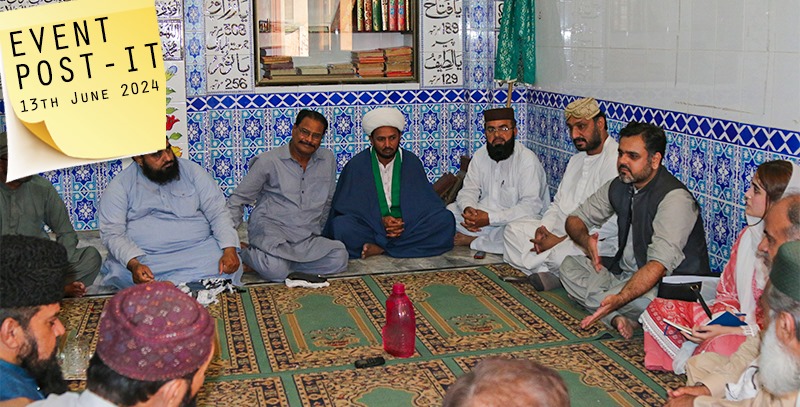FGD
Mental health cannot be treated with faith-based antidotes, say religious leaders
Date: September 21, 2024
Multan: “The prevalence of mental health issues is one of the most significant modern day challenges, which we previously paid no attention to. In finding solutions that address mental and emotional healthcare, faithful practice helps alleviate anxiety and stress, but religious antidotes alone cannot resolve mental health,” stated participants at Jinnah Institute’s focus group discussion with religious leaders in Multan.
Speaking with Jinnah Institute’s research team at a local mosque, religious leaders from multiple faiths and sects agreed that emerging social challenges must be discussed along with their appropriate remedies. As religious leaders, participants felt they held considerable influence over their communities, who regularly seek guidance on a host of social issues. “Traditional communities in South Punjab attach a great deal of importance to the word of a makhdum, waiz, peer, or imam. The roles we play as religious leaders must be leveraged for positive messaging, and a challenge like mental healthcare requires better awareness raising,” they recommended.
They highlighted that the advent of social media was bringing about profound social transformations. While the rise of digital technology came with its fair share of concerns, including the ethical application of Artificial Intelligence, participants emphasized that technology must be harnessed for socio-economic advancement. They saw that regulating the internet for bad content was not feasible; instead, efforts should be made to enhance learning and positive usage among younger users, who could apply digital technology for community welfare. “Let us be clear that it was religious conservatives who opposed technological innovation in the past out of prejudice and lack of knowledge. They felt threatened that the gramophone, radio and television will turn people away from them. Let us also admit that today we are the main beneficiaries of digital platforms, and must use our platforms responsibly,’’ stated one participant.
Religious leaders were proud to highlight that Multan stood apart from the rest of the country for its interfaith harmony and cohesion. Religious leaders had worked hard to build respect and camaraderie among Muslim, Christian and Hindu communities and routinely collaborated on interfaith dialogue, religious festivals, protection of places of worship and neigbourhoods. Participants also highlighted faith-based welfare initiatives, including provision of food, shelter, and medical assistance to underprivileged groups, as well as youth-focused programs on skills, vocational training and employment. “These initiatives are rooted in compassion and humanity; they have helped reduce distress, and strengthened our social fabric,” they stated.
This interaction was part of Jinnah Institute’s country-wide research study examining sources of community resilience, particularly in locations, and among socio-economic groups experiencing multi-dimensional vulnerability.

